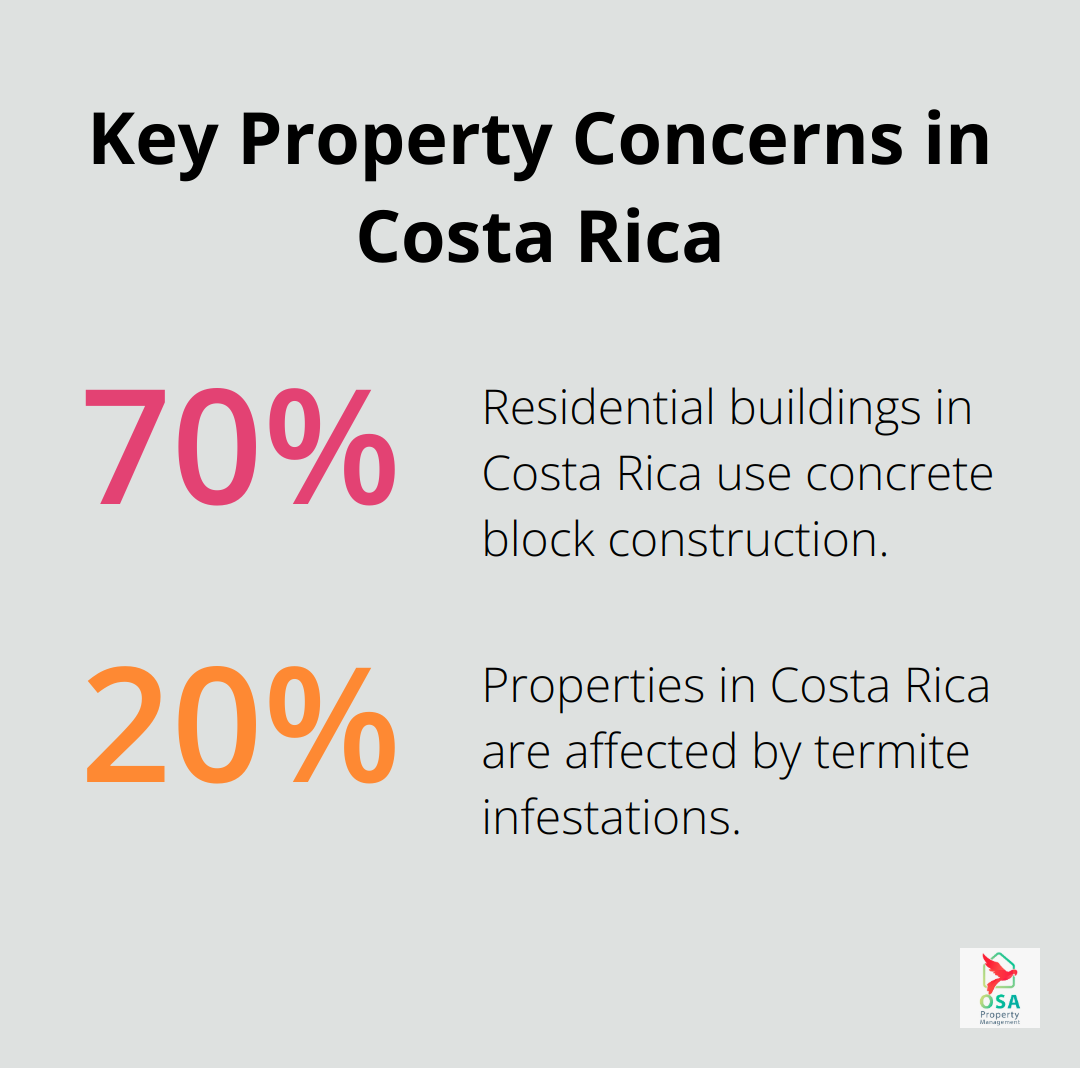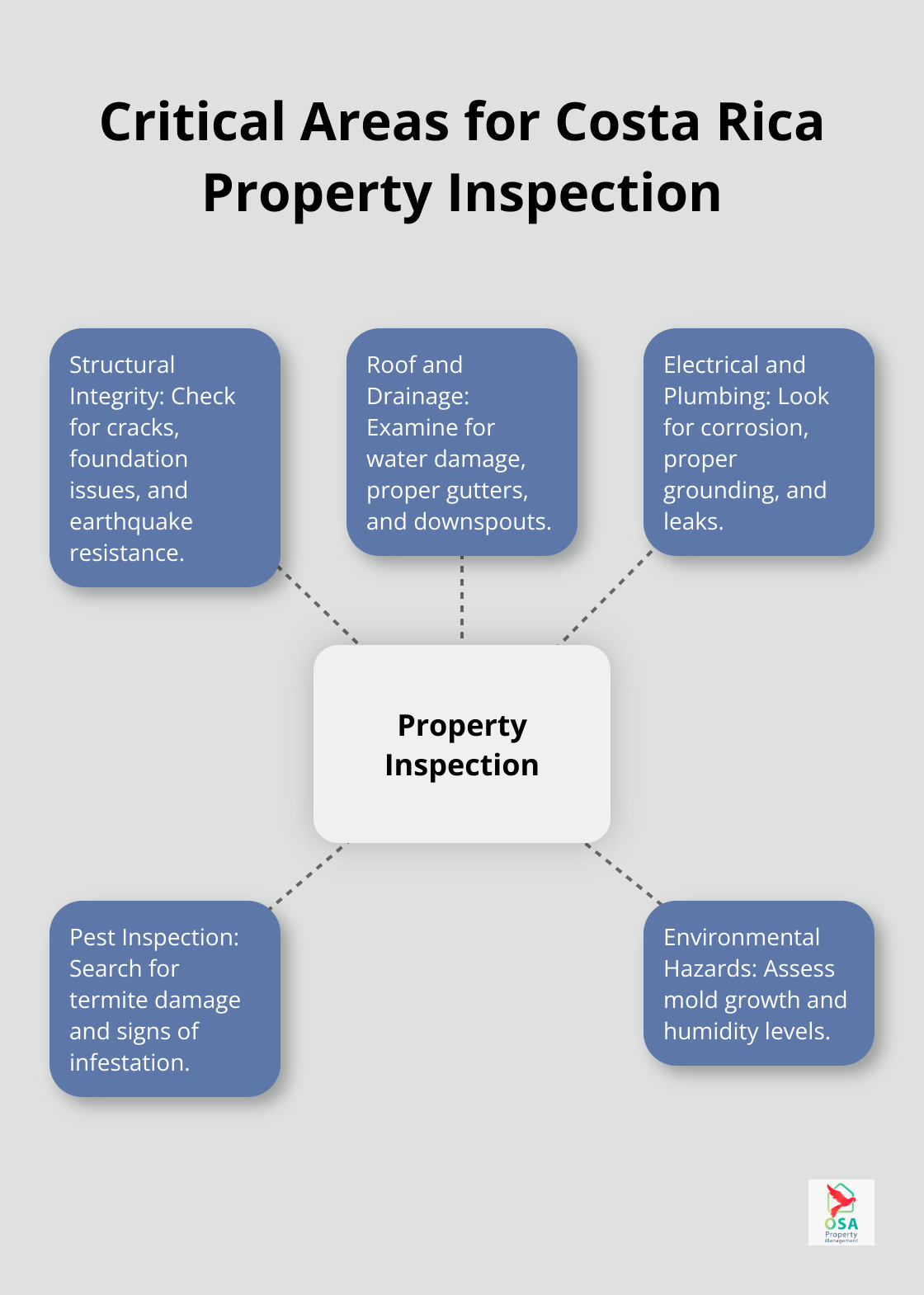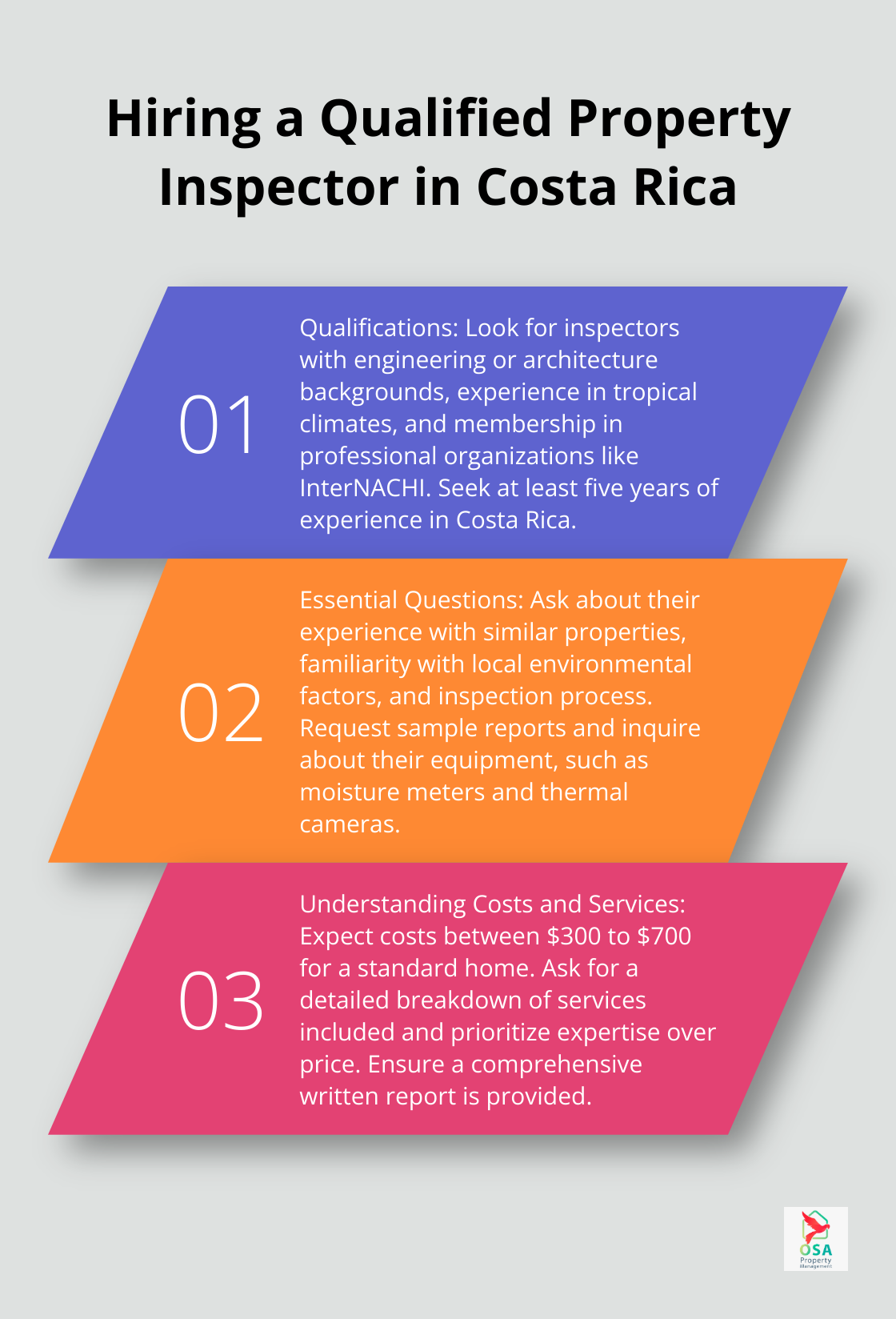Buying property in Costa Rica can be an exciting venture, but it comes with unique challenges. A thorough property inspection is essential to avoid costly surprises and ensure your investment is sound.
At Osa Property Management, we’ve seen firsthand how proper inspections can make or break a real estate deal in this tropical paradise. This comprehensive checklist will guide you through the critical aspects of Costa Rican property inspections, helping you make informed decisions and protect your investment.
Why Costa Rica’s Unique Environment Demands Thorough Property Inspections
Costa Rica’s tropical climate and diverse ecosystems create a unique set of challenges for property owners. The country’s environmental factors can significantly impact buildings over time. High humidity levels can lead to mold growth and structural deterioration if not properly addressed.
The Impact of Costa Rica’s Climate on Properties
Costa Rica’s mean annual temperature is 24.9°C, with average monthly temperatures ranging between 23.9°C (November) and 26.1°C (April). This warm climate can accelerate wear and tear on buildings, especially those constructed with materials unsuited for tropical conditions. Properties near the coast are particularly vulnerable to salt air corrosion, which can damage metal components and electrical systems.
Local Building Practices and Their Implications
Costa Rican construction methods often differ from those in North America or Europe. The use of concrete block construction is common due to its resistance to termites and humidity. However, this method can lead to issues if not executed properly. The Costa Rican Chamber of Construction reports that approximately 70% of residential buildings use this technique, making it important for buyers to understand its implications.

Hidden Issues in Tropical Properties
Tropical environments harbor unique challenges that may not be immediately apparent. Termite infestations affect an estimated 20% of properties in Costa Rica (as reported by the National Institute of Housing and Urban Development). These pests can cause significant structural damage if left unchecked.
Moreover, the country’s location in a seismically active zone necessitates careful inspection of a property’s earthquake resistance. The Seismic Code of Costa Rica, updated in 2010, sets strict standards for construction, but older properties may not meet these requirements.
The Value of Professional Inspections
Given these factors, professional property inspections are not just recommended – they’re essential. A thorough inspection can uncover issues that might otherwise go unnoticed, potentially saving buyers thousands of dollars in future repairs.
A comprehensive maintenance strategy can reduce property managers’ workload by up to 30%. This efficiency allows better allocation of resources and time, which underscores the value of investing in a comprehensive inspection before finalizing any property purchase in Costa Rica.
As we move forward, let’s explore the key areas that require careful examination during a property inspection in Costa Rica. These areas will help you create a comprehensive checklist to ensure no critical aspect is overlooked.
What You Must Inspect in a Costa Rica Property
When investing in Costa Rica real estate, a thorough inspection is essential. Here’s what you need to focus on during your property inspection:
Structural Integrity and Foundation
The foundation of the property demands your attention. In Costa Rica, concrete construction is common. This method is durable and well-suited for Costa Rica’s tropical climate, which includes heavy rains and high humidity. Check for cracks in walls, especially around windows and doors. These might indicate foundation problems or seismic damage.
Costa Rica experiences earthquakes regularly. This fact underscores the importance of assessing the property’s earthquake resistance. Verify if the building complies with the 2010 Seismic Code of Costa Rica, which establishes construction standards.
Roof and Drainage Systems
Costa Rica’s heavy rainfall, particularly during the wet season from May to November, makes roof condition and drainage critical. Examine the roof for signs of water damage, missing tiles, or rust if it’s metal. Confirm that gutters and downspouts are in good condition and properly direct water away from the foundation.
Electrical and Plumbing Systems
High humidity in Costa Rica can damage electrical systems. Search for signs of corrosion on outlets and switches. Confirm that the property has proper grounding and circuit breakers. For plumbing, inspect for leaks, water pressure, and signs of rust or corrosion. In coastal areas, salt air accelerates the deterioration of these systems.
Pest and Termite Inspection
Termites pose a significant concern in Costa Rica. Look for mud tubes on exterior walls, hollow-sounding wood, or visible damage to wooden structures. Consider hiring a professional pest inspector for a comprehensive assessment.
Environmental Hazards
Mold and humidity are common issues in Costa Rica’s tropical climate. Examine walls, ceilings, and corners for signs of mold growth. Use a humidity meter to check moisture levels in different areas of the property. High humidity can lead to health issues and damage to furniture and electronics.

A comprehensive inspection can prevent costly repairs and maintenance in the future. The unique climate of Costa Rica presents specific challenges that require expert knowledge. In the next section, we’ll discuss how to find and hire a qualified professional inspector in Costa Rica to ensure you don’t miss any critical issues.
How to Find and Hire a Qualified Property Inspector in Costa Rica
Qualifications That Matter
Costa Rica does not require property inspectors to hold specific licenses or certifications. However, this fact should not lead you to hire just anyone. You should look for inspectors with engineering or architecture backgrounds, preferably with experience in tropical climates. Membership in international organizations like the International Association of Certified Home Inspectors (InterNACHI) can indicate a commitment to professional standards. InterNACHI-Certified Home Inspectors are required to complete twenty-four (24) hours of Continuing Education every year to renew their certification.
You should seek inspectors with at least five years of experience in Costa Rica. This experience ensures they know local building practices and common issues in tropical properties. Knowledge of Costa Rican building codes, especially the 2010 Seismic Code, is important for a thorough inspection.
Essential Questions for Potential Inspectors
When you vet inspectors, ask about their experience with properties similar to the one you consider. Inquire about their familiarity with local environmental factors like humidity, termites, and salt air corrosion. Request sample reports to gauge the depth and clarity of their assessments.
Ask about their equipment. A well-equipped inspector should have tools like moisture meters, thermal cameras, and electrical testers. These tools are essential for detecting hidden issues in Costa Rica’s challenging climate.
Do not hesitate to inquire about their process for inspecting critical areas like foundations, roofs, and electrical systems. A good inspector will explain their methodology and highlight the specific challenges of Costa Rican properties.
Understanding Costs and Services
Inspection costs in Costa Rica vary widely (typically ranging from $300 to $700 for a standard home). Factors affecting the price include property size, location, and the inspector’s experience. While it might tempt you to opt for the cheapest option, a thorough inspection can save you thousands in future repairs.
Ask for a detailed breakdown of what’s included in the inspection. A comprehensive inspection should cover all major systems and structures, including those unique to tropical environments. Some inspectors offer add-on services like termite inspections or air quality tests, which can provide value in Costa Rica’s climate.
Ensure the inspector provides a written report with detailed findings and recommendations. This document is important for negotiating with sellers and planning future maintenance.
While cost is a factor, you should prioritize expertise and thoroughness over price. A skilled inspector might charge more but can provide invaluable insights that protect your investment in Costa Rica’s unique real estate market.

Final Thoughts
Investing in Costa Rica real estate offers exciting opportunities, but it also presents unique challenges. A comprehensive property inspection protects your investment in this tropical paradise. You must understand the specific environmental factors that affect properties in Costa Rica to make informed decisions and avoid costly surprises.
Property inspection in Costa Rica requires specialized knowledge and experience. Osa Property Management understands the intricacies of Costa Rican real estate and the importance of thorough inspections. Our team can assist in finding qualified inspectors, interpreting inspection results, and developing maintenance strategies tailored to Costa Rica’s unique climate.
A property inspection is more than a formality; it safeguards your investment. You can approach your Costa Rica property purchase with confidence when you partner with experienced professionals (like us) and utilize a comprehensive checklist. This approach ensures that your tropical dream home remains a source of joy rather than unexpected challenges.

